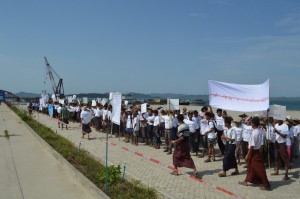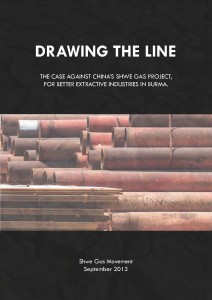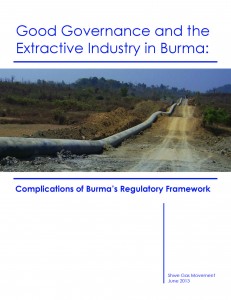Posts Tagged ‘Shwe Gas Movement’ (17 found)
A Dangerous Precedent for Development in Burma
 On 30 September, Shwe Gas Movement released a new report entitled, “Drawing The Line: The Case Against China’s Shwe Gas Project, For better Extractive Industries in Burma”. The report highlights the consequences, violations, unequal development, inadequate laws and the dangerous precedent set by the Shwe Gas Project. With increased investment and the liberalization of Burma’s economy, development projects similar to Shwe Gas are set to increase. If they follow a path of code and conduct similar to the Shwe Gas Project, the future of Burma will be rife with increased land confiscation, labor abuse, environmental degradation, loss of livelihoods, conflict, arrests and imprisonment of rights activists defending themselves and their communities. The benefits will be unequally distributed and negative consequences will be borne by farmers, fishermen, and by the citizens of Burma.
On 30 September, Shwe Gas Movement released a new report entitled, “Drawing The Line: The Case Against China’s Shwe Gas Project, For better Extractive Industries in Burma”. The report highlights the consequences, violations, unequal development, inadequate laws and the dangerous precedent set by the Shwe Gas Project. With increased investment and the liberalization of Burma’s economy, development projects similar to Shwe Gas are set to increase. If they follow a path of code and conduct similar to the Shwe Gas Project, the future of Burma will be rife with increased land confiscation, labor abuse, environmental degradation, loss of livelihoods, conflict, arrests and imprisonment of rights activists defending themselves and their communities. The benefits will be unequally distributed and negative consequences will be borne by farmers, fishermen, and by the citizens of Burma.
The Shwe Gas Project is the largest extractive resource project in Burma with dual gas and oil pipelines traveling almost 800km beginning in Arakan State, passing through Magway and Mandalay Regions, exiting Burma through northern Shan State and terminating in Kunming, China. The now operational project provides China with a valuable energy transportation system and is expected to earn US$54 billion for the Burma government, a government that was given the lowest resource governance ranking in the world three months ago by the Revenue Watch Institute […]
New Report: Shwe Gas Project Sets Dangerous Precedent
A new report released by Shwe Gas Movement calls for suspension of the Shwe Gas Project on the grounds that it sets a dangerous precedent for the extractive industries and leads to ongoing human rights abuses that include land confiscation, poor labor practices, environmental damage and exacerbation of tensions with ethnic nationalities […]
• • •Drawing The Line: The Case Against China’s Shwe Gas Project, For Better Extractive Industries in Burma
 The Shwe Gas project, the largest extractive project in Burma, set to earn US$54 billion for the Burmese government, has just begun transferring Burma’s natural gas to China. As the first such project to become operational under the new quasi-civilian government, its management will set the precedent for how future extractive projects will be carried out as Burma opens up for investment and resource bidding. As it stands, the standard is not good […]
The Shwe Gas project, the largest extractive project in Burma, set to earn US$54 billion for the Burmese government, has just begun transferring Burma’s natural gas to China. As the first such project to become operational under the new quasi-civilian government, its management will set the precedent for how future extractive projects will be carried out as Burma opens up for investment and resource bidding. As it stands, the standard is not good […]
Burma: Release Ten Arakanese Activists, Amend Peaceful Assembly and Peaceful Processions Law
Targeted Prosecutions of Peaceful Protesters Continue
The government of Burma should immediately release ten Arakanese activists convicted of violating Burma’s Law on Peaceful Assembly and Peaceful Procession after protesting a Chinese-led natural gas project in western Burma, four nongovernmental organizations said today. On 26 September, the ten activists were sentenced to three months in prison for their participation in a peaceful protest against adverse impacts of the transnational gas project on 18 April on Maday Island in Burma’s western Arakan State. The Shwe Gas Movement, Burma Partnership, Human Rights Education Institute of Burma and Fortify Rights International called today for the immediate release of the activists and for the urgent amendment of the controversial law […]
• • •Good Governance and the Extractive Industry in Burma
 As the country begins to open up for the first time in more than 60 years, foreign investors and energy consumers worldwide are beginning to look progressively towards Burma and its rich natural resources. Aimed at policy makers, investors, corporations, various governments, intergovernmental groups and other stakeholders, this briefer seeks to highlight the necessity of a sound domestic legal framework in Burma through a critical analysis of the current limitations and implications thereof […]
As the country begins to open up for the first time in more than 60 years, foreign investors and energy consumers worldwide are beginning to look progressively towards Burma and its rich natural resources. Aimed at policy makers, investors, corporations, various governments, intergovernmental groups and other stakeholders, this briefer seeks to highlight the necessity of a sound domestic legal framework in Burma through a critical analysis of the current limitations and implications thereof […]
Burma’s Extractive and Environmental Governance in Need of Overhaul
A new report released by Shwe Gas Movement today reveals glaring weaknesses in Burma’s legal framework regarding the extractive industries, resulting in human rights abuses, environmental damage and poor revenue distribution. A panel of experts was convened today to present the findings of the report […]
• • •Myanmar Lowest Ranking Nation in Resource Governance: Revenue Watch Institute
Myanmar was given the lowest resource governance ranking in the world according to a new index, released by the Revenue Watch Institute. The Shwe Gas Movement, which monitors Burmese natural resources, stated the result shows it is premature to invest in the resource rich […]
• • •Campaigners Around the World Call to Postpone Destructive Chinese Pipelines in Burma
130 organizations over 20 countries today held demonstrations and submitted letters calling on Burma’s President Thein Sein to postpone China’s trans-Burma oil and gas pipelines project. The letter expressed serious concerns over human rights abuses as well as […]
• • •Arakanese Take to the Streets to Demand Gas be Used for Arakan Electricity
Today over 250 Arakanese took to the streets in the state capital of Sittwe and across two townships, wearing t-shirts, pasting stickers and posters, demanding that natural gas from Arakan coastal waters be used to generate 24-hour electricity throughout the state before any is exported to China […]
• • •Activists condemn Norway’s Refusal to Heed Council of Ethics’ Warning on Pipeline Investments in Burma
Norway’s Ministry of Finance announced this week the government’s pension fund will proceed with investments in Burma despite warnings from the Norwegian Council of Ethics that it may contribute to violation of human rights […]
• • •








 All posts
All posts